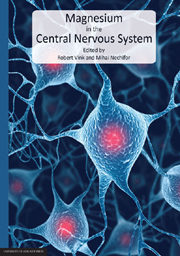Book contents
- Frontmatter
- List of Contributors
- Preface
- Contents
- Section 1 Magnesium in Normal Brain
- Section 2 Magnesium in Neurological Diseases
- Section 3 Involvement of Magnesium in Psychiatric Diseases
- Chapter 18 Magnesium and Alzheimer's disease
- Chapter 19 Magnesium and stress
- Chapter 20 Magnesium in neuroses
- Chapter 21 Magnesium, hyperactivity and autism in children
- Chapter 22 Magnesium in psychoses (schizophrenia, bipolar disorder)
- Chapter 23 Magnesium and major depression
Chapter 22 - Magnesium in psychoses (schizophrenia, bipolar disorder)
from Section 3 - Involvement of Magnesium in Psychiatric Diseases
Published online by Cambridge University Press: 05 June 2012
- Frontmatter
- List of Contributors
- Preface
- Contents
- Section 1 Magnesium in Normal Brain
- Section 2 Magnesium in Neurological Diseases
- Section 3 Involvement of Magnesium in Psychiatric Diseases
- Chapter 18 Magnesium and Alzheimer's disease
- Chapter 19 Magnesium and stress
- Chapter 20 Magnesium in neuroses
- Chapter 21 Magnesium, hyperactivity and autism in children
- Chapter 22 Magnesium in psychoses (schizophrenia, bipolar disorder)
- Chapter 23 Magnesium and major depression
Summary
Abstract
Schizophrenia and bipolar disorders are two of the most severe CNS conditions. Changes in plasma and intracellular magnesium concentration, as well as other bivalent cations, have been found in both psychoses. Our data, as well as that of other authors, has shown that schizophrenic paranoid patients admitted in the acute state and without previous treatment, have significantly decreased intracellular magnesium levels compared to healthy subjects. Therapy with haloperidol (a typical antipsychotic) or with risperidone (an atypical antipsychotic) both significantly raised the intracellular magnesium concentration without causing significant changes in plasma magnesium concentration. The increase in intracellular magnesium concentration was positively correlated with the improvement in clinical symptomatology. We consider that Mg2+ acts foremost by reducing glutamate release and by its action upon NMDA receptors, and results in an augmentation in the activity of the GABAergic systems. Unlike the hypothesis that only implicates zinc deficits in the pathogeny of schizophrenia, we consider that both intracellular magnesium and extracellular zinc deficits are equally involved in schizophrenia pathogeny. In patients with untreated bipolar disorder, our data showed a significant decrease in intracellular magnesium concentration and plasma zinc concentration during the manic episode. Therapy with mood modulators (carbamazepine and valproic acid) increased total intracellular magnesium and plasma zinc concentrations without having a significant effect on total plasma magnesium concentration. Other data showed that lithium also increases intracellular magnesium concentration. The fact that mood modulators with different mechanisms of action have in common the increase of intracellular magnesium concentration is an argument to consider this augmentation as an important element of their mechanism of action.
- Type
- Chapter
- Information
- Magnesium in the Central Nervous System , pp. 303 - 312Publisher: The University of Adelaide PressPrint publication year: 2011
- 2
- Cited by



